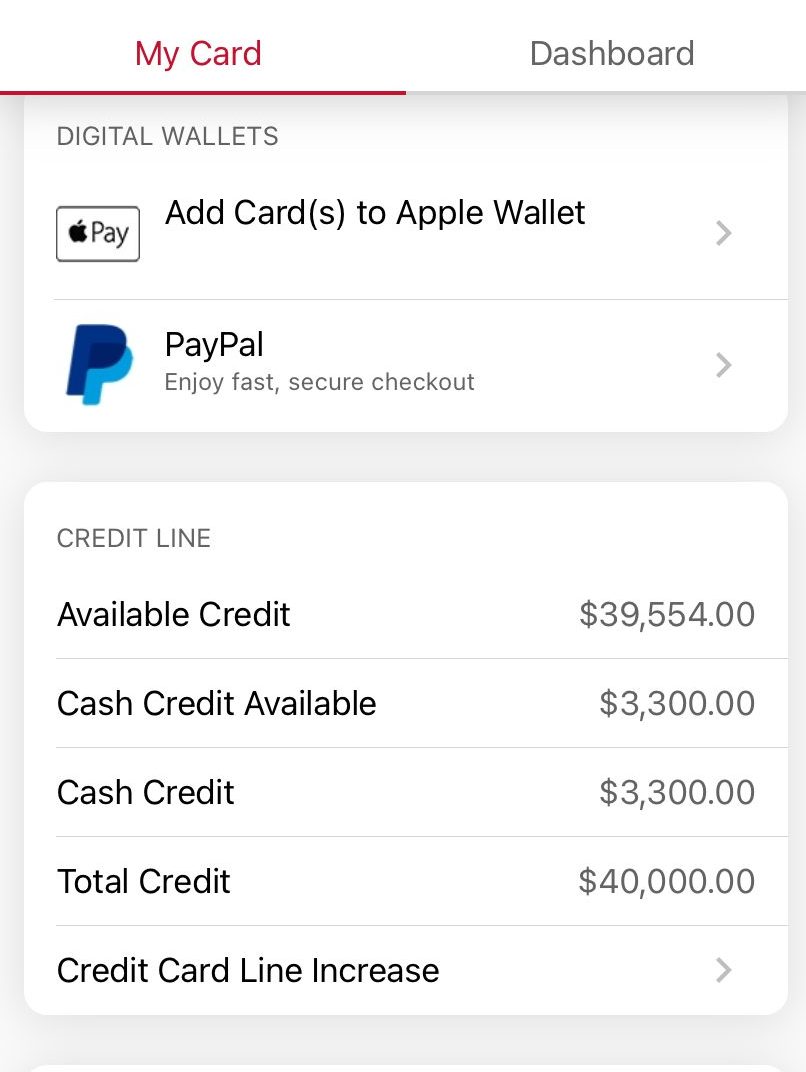Table Of Content
Key Takeaways
- Some credit issues might increase your credit limit automatically. This can happen as long as you do not use the maximum credit limit and make payments on time.
- When asking for an increase in credit limit, it might be better to ask for a reasonable increase, something like 10% to 25%. Being too aggressive in this regard might lead to rejection.
- When asking for an increase in credit limit it is important to gather all of the relevant information about your income and debts, as well as prepare some compelling arguments why might bank consider raising your limit.
The Benefits Of Credit Limit Increase
By having a higher credit limit, you have more financial resources available to meet your needs and can make larger purchases if necessary. Here are the main benefits:
Increased purchasing power: A higher credit limit allows you to make larger purchases and can be helpful in case of emergencies.
Improved credit utilization: Increasing your credit limit can lower your credit utilization ratio, which is the amount of credit you are using compared to the amount you have available. A lower credit utilization ratio can have a positive impact on your credit score.
Flexibility: With a higher credit limit, you have more flexibility to make purchases and have a cushion for unexpected expenses.
Emergency funds: A higher credit limit can act as a backup source of funds in case of an emergency.
Credit score boost: If you use your credit responsibly and make timely payments, a credit limit increase can have a positive impact on your credit score.
This chart created with Experian data shows that those with an average to good credit score have an average credit utilization ratio of the optimum 33%. This ratio drops significantly for those with very good and excellent scores.
At the other end of the scale, the chart shows that those with poor credit scores typically have a very high credit utilization ratio, with an average of 73%. This will be a massive factor in lending decisions for those in this group.
How to Get Credit Card Limit Increase?
While the issuer decision will mainly rely on your financial situation, there are a couple of steps you can take in order to increase the chance of success:
-
Check For Automatic Credit Limit Increase
There are card issuers that will increase your credit limit as you demonstrate that you are a responsible credit card holder. It could mean that you do not exhaust your total credit limit and you make your payments adequately and on time every month.
Many credit card issuers have a system that reviews all the accounts regularly and triggers a raise in the credit limit of cardholders who meet their criteria.
-
Prepare All The Documents You Will Need
As we’ve mentioned previously, your card issuer would want to know your current annual income, your employment status, how much you pay monthly for your housing loan, etc. Have this information and the relevant documents ready before you place your call.
You read it correctly: call. We know that your card issuer would probably have an online facility to request a line increase, but you’ll have a better opportunity to present your supporting information if you can speak to a live representative over the phone.
If you talk to a warm body from the card company, you’ll be able to ask all the questions you want. What more, the representative might be able to approve a certain amount of additional credit without having to go through a hard inquiry (and that works to your advantage).
-
Have a Good Convincing Reason
Before applying for any increase, you should have already settled why you want or need it. You should be able to confidently say that you are handling your current debts comfortably and responsibly.
It’s not about just being able to make the monthly minimum but being able to pay in full or slightly less. You should only ask if you can pay your balance in full every month at your current income.
Don’t apply for an increase if you’re planning to use the extra credit to make ends meet or you’re hoping that your income will somehow rise in the next few months.
-
Ask For a Reasonable Increase
Don’t ask for a huge increase but be a little conservative. The credit card companies follow their own guidelines in handling credit limit increase requests. Ultimately, they will have to base their decision on your credit plus the kind and amount of increase that you ask for.
How much should you ask? Around 10% to about 25% would be a nice amount, as a general rule.
If you shoot for the moon and get a rejection, you would probably have to wait for two or three months before they can act again on another request from you. Don’t forget that every time you make a request, you also trigger a credit-deflating inquiry into your account.

-
Prepare Your Case Well
Experts advise that you stick to the basics when asking for a credit limit increase. Just keep it simple – those who evaluate your request will appreciate a terse request.
Here are some other tips on how to present your case:
- Have your notes and talking points handy, such as how much you are asking and your justification.
- List down your questions and get answers – before committing to the request. Make sure that everything is already clear to you before you close to talk. Ask what they don’t tell you on their website, like, “Can I ask for another increase later?” or “Will this request trigger a hard inquiry on my credit report?”
- Keep your cool and patiently explain your reason for the request. Be polite and keep calm when things don’t go as expected or even if the representative becomes challenging. You can stop the call and try again later – with some luck, you might get a different but much nicer representative.
- If they say ‘No,’ find out why. It will help to know exactly why they declined to grant you an increase so you can begin to work on it and increase your chances later. For example, they might see that you’re saddled with many high balances and consider you high risk. You can create a repayment plan to retire most, if not all, of them. Once you improve your situation, you can go at it again.
Even before you talk to the representative, the conditions that merit approval or disapproval will already be there. What you say may not matter regarding increasing your chances if you have a low credit score, poor payment history, or adverse findings on your report.
Nevertheless, saying the right things might overturn some negative perceptions about you.
-
Be Rational, No Desperate
If you call the card company with a sad story and a crying voice, hoping to appeal to their emotions and make them approve your request, that will not work.
They will not focus on the reason why you want or need it. They, however, will listen if you tell them why you deserve it. Here are some samples why:
- You have been a loyal customer for X number of years/months and never missed a payment. Make sure that you have been a customer for more than six months.
- You pay off your balance each month.
- You habitually pay more than the minimum balance each month.
- You’re just using 30% or less of your credit limit.
- You’ve never been late in paying your credit card bill.
- Your income is higher now than a few months ago.
The person on the other end of the line is a person who can help you, so keep that in mind. He has a job to do and is protecting his company's interest, so don’t antagonize him.
Being rude will only hurt your case, and yelling or cursing at a representative will give them the right to hang up on you. You can imagine what recommendation he will give regarding your request.
Credit Limit Increase - Things To Consider
Here are the main things to do when considering a credit card limit increase:
-
You Can Transfer Credit Card Limits
You can avail of this option but do it very carefully. Many card companies allow the transfer of a card’s credit limit to another credit account only if the company issued both cards.
It could be downright laborious and if you don’t do it right, you risk hurting your credit score. To illustrate, if you hold two different Bank of America credit cards with a credit limit of $3,000 per card, you can transfer $1,500 from the first card’s credit limit to the second card.
If, however, after transferring the spending limit over to the second card you decide to close the first card, it will probably impair your credit score.

-
If You Score Increased Recently, Your Chances Are Higher
Get a copy of your credit report and review if all the information in there is accurate. If there is an erroneous entry, you can send a dispute letter so that the credit agency can investigate and make a correction.
While you can use this tool to dispute information on the report, you need to make sure that you correct the mistake on all three of your credit reports. Issuers consider late payments as a sign of risk so keep all your accounts up to date.
Review your credit report to check for anything that might hurt your chances of approval. If you spot an error and start the process to fix it, it typically takes about two months, so it's best to wait until that's resolved before applying. Pay close attention to your credit usage as well. For each card you have, check your credit limit and how much of it you're using each billing cycle.

-
Check If Your Income Is Enough To Pay For Your Debts
Lenders will definitely want to look at your debt to income ratio or how much debt you owe in relation to how much money you make. This will tell them if you have the ability to comfortably have more debt and not run the risk of default.
You must show that you have a steady and stable income source, so you have to make sure that your employment and income are accurate and sufficient.
-
Mind Your Debts And Credit Card Spending
Card issuers seriously look at how you manage your money and debts by looking at your debt and spending history. And do take note that they don’t just concern themselves with how much you owe them but how much you owe from all your lenders.
-
Paint A Nice Payment History Picture
Perhaps one area in your credit report that calls the bigger attention of lenders is your payment history.
They want to know if you are able to manage your debts well by paying enough and on time. View your payment history from the perspective of the card issuer to get a better appreciation of the process. Have you had any late payments in the past six to twelve months? If the answer is yes, then they would probably say “No”.
Did you make only the minimum payments in the last six months? The same thing, better postpone your request.
-
Do You Really Need That Much More Credit?
When it comes to taking on more debt, whether you're applying for a new credit card or requesting a credit limit increase, it’s important to figure out exactly how much additional credit you need. Do the math to determine how much debt you can comfortably handle before reaching out to the credit card company. They’ll offer you whatever they can, but it's up to you to know what works for your financial situation.
Just be cautious. Don’t allow a larger limit to drive you into buying things you don’t need. You might overspend and bury yourself in debt.
-
Credit Limit Increase Fees
You should know that some banks will collect a fee when they increase your credit limit. For example, the Credit One Bank Visa Platinum credit card can charge up to $49 when you request for an increase in your limit.
The First Premier Bankcard charges 25% of the increase every time you get an approval for a credit limit increase.
If you have one of these cards or a similar card, forget about asking for a credit limit increase and try with a more appropriate card as soon as you’re ready.
Credit Limit Increase Tips
Here are the main things to do when considering a credit card limit increase:
-
Pick Only One Card For Your Request
When you request for an increase, the card company will have to check your credit history to see if you deserve a line increase.
Your credit report will reflect this credit pull and will slightly lower your score. However, if multiple card companies begin pulling your report, you can bet that the impact on your score would not be negligible.
Aside from that, the different lenders will know that other issuers are reviewing your account as well and that may paint a picture that you are really desperate for more credit. Most will consider this as a red flag and may lessen your chances of getting an approval.
Which One is Better: New Card Vs Limit Increase?
It all depends on your personal situation.
If you have an excellent credit report and you’ve faithfully kept all your debt payments up-to-date, you have a great chance of getting approved for a new card. Who knows, the issuer might even give you a higher credit limit than your current credit card?
If your credit is really exceptional, the card company might even enroll you in their rewards program or give you a cash back card plus some perks for your outstanding credit card spending and payment history.
How Do Credit Card Issuers Set The Credit Limit?
The credit card issuer will gauge your credit history, income, and current total debts in the credit limit evaluation process.
From these factors, they will be able to set your credit limit. The rule is, the better your credit history, the more likely you’ll get a higher limit.
Here's the good news: your credit limit can also go the other way.
In some cases, in your spend responsibly and historically pay off your balance early or on time, the card issuer will conclude that you are a low-risk customer and automatically increase your credit limit even if you don’t make such a request.
But this is the exception rather than the rule. Many card companies will not automatically increase your credit limit. If you want to increase your credit limit, you might have to do some negotiating.
This requires that you call your card issuer and explain to their representative why you need an increase in your limit and convince him that you deserve one.
How to Increase Your Credit Limit - FAQs
How often should I request a credit limit increase?
Every six months is usually the norm. For example, some Capital One cards state that you may only apply for an increase in your credit limit every six months. In addition, your account can’t be older than three months.
American Express is another company that has a variety of cards that only allow credit limit increases every six months. Furthermore, your account with them must be at least 60 days old.
Does credit increase denial hurt credit?
Possibly. Denial of increased credit limit may affect your credit score. Whether this is the case, though, depends on whether the card issuer will review your credit report through a hard or soft inquiry before making a decision.
If it is a soft query, your credit score will not be affected at all. However, similar to when applying for a new credit account, hard queries may affect your score, thereby causing it to drop slightly.
How much of a credit increase should I ask for?
The answer to this question largely depends on your needs. To request a larger credit limit, just call your credit card provider and ask. Ask the customer service representative to consider your membership years, good payment records, and low credit utilization.
If you have a low credit score, you can still request a higher limit. If you have an emergency car repair bill, you may only need to increase your credit limit by $1,000.
What are the benefits of a higher credit limit?
A credit limit increase can reduce credit utilization, which may improve your credit score. You credit score serves as an important indicator used by lenders to determine the borrower’s ability to repay.
A higher credit line can also be an effective way to make large-scale purchases and provide emergency funding sources. If the increase in your credit limit encourages you to spend more than you can afford, then the increasing debt may exceed any gains.
How Your Credit Limit Affects Your Overall Credit Score?
Usually, your lender will review your credit history and consider the additional credit limit you request. As part of this process, the lender may obtain a copy of your credit report. This is called a hard query.
Hard credit inquiries may affect your credit score because the credit scoring model considers the time and frequency of your recent credit application. However, there are some credit cards that don’t perform hard credit inquiries, thus ensuring your credit score remains unaffected.
Is Requesting a Credit Increase a Hard Inquiry?
Again, it depends on the company. Credit card companies like Capital One do not perform hard credit checks. Instead, only soft credit checks are performed to see where you stand financially. As a result, your credit score remains untouched.
But many companies do perform hard checks, which do affect your credit score. Therefore, you should be certain that you want to request a credit limit increase before contacting your credit card company.



